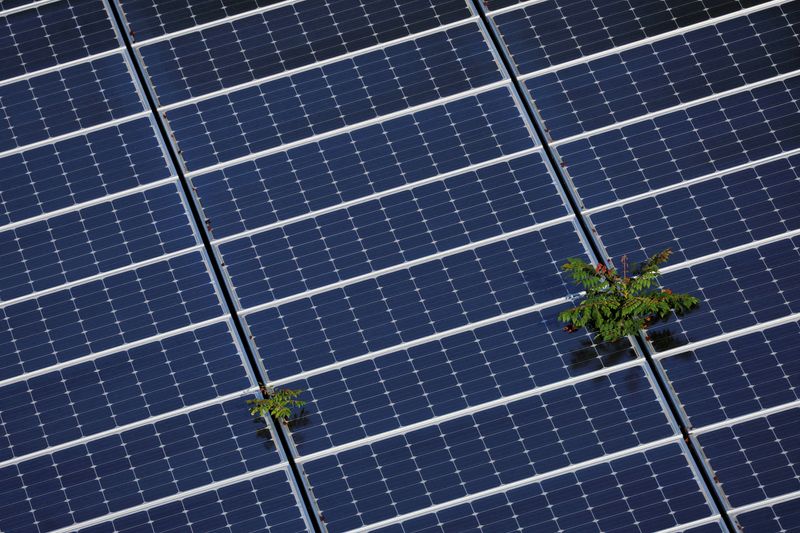By Valerie Volcovici and Nichola Groom
WASHINGTON/LOS ANGELES (Reuters) - U.S. regulators on Thursday approved proposals to speed up the connection of new power projects to the electric grid, reforms that could ease a growing backlog of requests from wind and solar energy developers.
Long waits for transmission interconnection have hobbled the deployment of big renewable energy projects that the Biden administration wants built to move away from fossil fuels like coal and natural gas and help combat climate change.
Today there is more than 2,000 gigawatts of renewable power waiting to be connected to the grid -- nearly double the amount of current U.S. generation capacity, Federal Energy Regulatory Commission Acting (FERC) Chairman Willie Phillips said at a press conference following the unanimous vote.
"This rule is a major first step in our journey to addressing transmission reform," he said.
The FERC final rule will enact several changes to the burdensome interconnection process, including shifting it from a "first come, first served" to a "first ready" approach – meaning projects that are prepared with land rights and permits would move ahead of those that are not.
It will also impose financial and other conditions to secure a place in the interconnect queue and establish penalties of up to $2,500 per day for grid operators if they fail to complete interconnection studies on time. FERC will also allow projects to be studied in clusters instead of one-by-one in hopes of speeding up the process.
New power generators and battery storage resources must go through a complex process before they can be connected, including multiple studies of how their projects will affect the grid that FERC says take an average of five years.
Grid operators have been overwhelmed with requests as more and more wind and solar resources have been developed to displace aging fossil fuel plants. Nearly one year ago, the landmark Inflation Reduction Act also became law, aiming to boost renewable energy projects.
The reforms will discourage speculative, commercially non-viable interconnection requests and enable transmission providers to focus on processing requests that have a greater chance of reaching commercial operation, FERC said.
The solar energy trade group Solar Energy Industries Association (SEIA) said it was pleased with the final rule, but that more reforms were needed.
"While this is a decisive step forward, we have a long way to go before we clear the two terawatts of generation and storage that are trapped in the interconnection queue," Melissa Alfano, SEIA's director of energy markets, said in a statement.
The interconnection rule is part of a broader package of reforms FERC is working on in coming months to help hasten the deployment of renewable energy and storage. It is also seeking to finalize proposals this year to improve planning and cost allocation for transmission lines.
Rob Gramlich, president of Grid Strategies, an electric transmission advisory group, said Thursday's reform was low-hanging fruit that doesn't address the root problem of insufficient transmission capacity.

"Regardless of the Commission’s final policy calls, the process-focused rules that are in this rule by themselves don’t do anything to solve the underlying transmission capacity constraints," he said.
FERC chief Phillips told reporters the commission is working "as fast as we can" to complete other transmission reforms and expects "progress in the coming months."